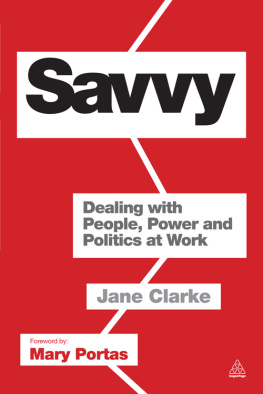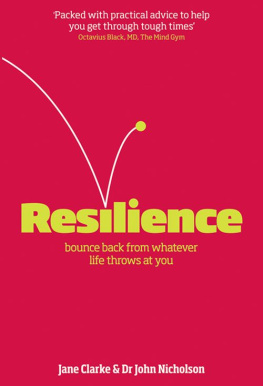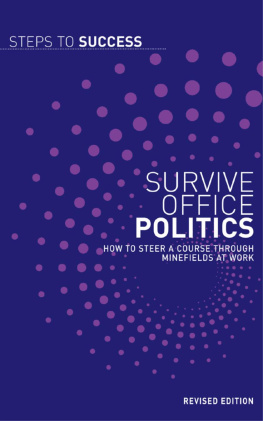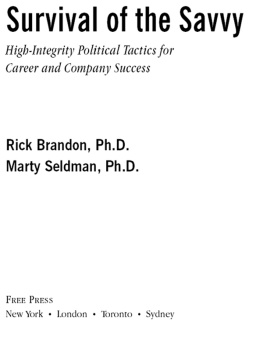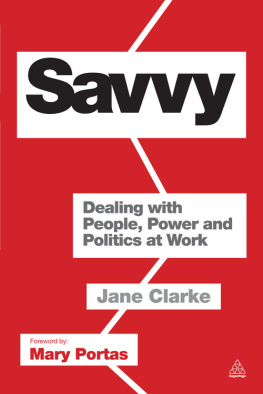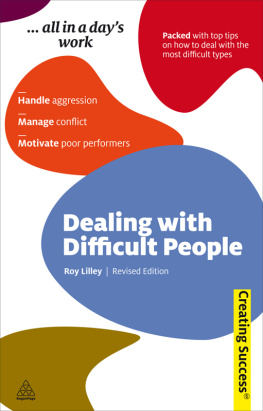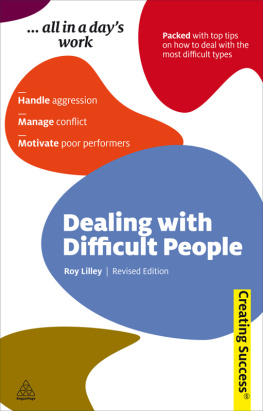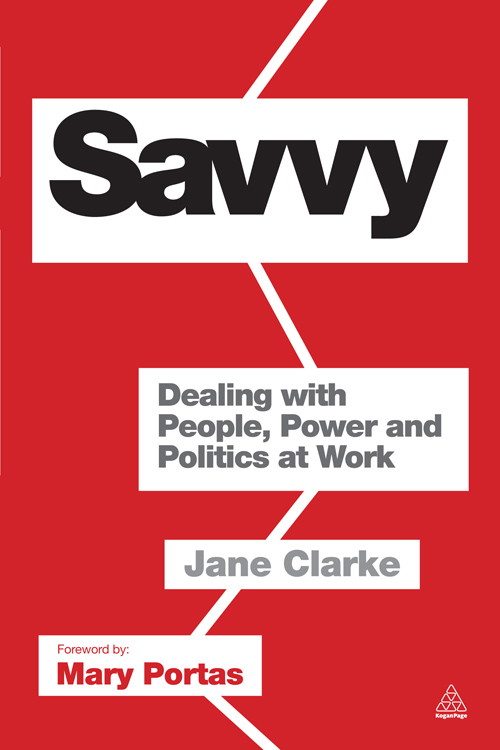Note on the Ebook Edition For an optimal reading experience, please view large
tables and figures in landscape mode. |
This ebook published in 2012 by
Kogan Page Limited
120 Pentonville Road
London N1 9JN
UK
www.koganpage.com
Jane Clarke, 2012
E-ISBN 9780749465278
Contents
Foreword
F or me, the moment anyone uses the word politics in business I want to run for the hills. But actually this isnt about politics at all thats just an office terminology this is about being savvy. About having positive relationships in the workplace and using them to get the outcome required for the advancement of your career, personal happiness and the success of the business.
I left corporate life to set up my own business, because I couldnt deal with office politics. Little did I know then it was because I simply did not know how to. If only Id had this book!
In my latter years as Creative Director at Harvey Nichols, most of my time was spent lobbying. I was the ideas generator and the change person; that was my job but the Board was all about consensus. I thought that if I had the vision, and really flew the flag, other people should feel the same way. But that didnt happen. I got into the position where I wasnt developing ideas, just lobbying. Instead of fighting the system, I should have played it.
Fifteen years into my own business, and with several TV series and a Government project under my belt, I can safely say the need for negotiation never goes away. The pace of politics is painfully slow. I feel my chest contracting as I think about it.
I now have 50 people working for me and Im doing it with them. And they must be doing it with me.
These days, when people tell me, Thats a mad idea, WHAT IS A MAD IDEA is I feel confident enough about who I am to just go with it. I couldnt do that in the past. Or could I? What would I have done differently if this book was around then?
This book is like business therapy like a really great session with a therapist who cares about you. It helps you to understand that dealing with the politics is just about work behaviours which get the most out of yourself and out of other people your bosses and the team.
Its learning about how to get through your working life and, most importantly, make it enjoyable. Its about knowing your strengths and surrounding yourself with people who complement your strengths (and compensate for your weaknesses). And in a leadership position, its all about the skills to get harmony and focus and balance others energies. This is all so vital; I wish Id learnt it all earlier. You wouldnt walk down the street naked, so dont walk into the office naked! Read this book.
Mary Portas
I would like to acknowledge the contribution of my colleagues at Nicholson McBride, who have been highly supportive throughout the process of writing this book from concept stage to final proofs. Most notably, thanks are due to Kate Brown, Rubina Patel, Emma Seward, Francesca King, Ruth Colling, Helen Fisher, Emily Frhlich, Nick Kambitsis, Kath Timmins and Geraldine Whitehouse. John Nicholson, as ever, has been instrumental in inputting ideas, editing and proofing. So too has Edward Creasy, whose support and criticism have been invaluable. Dan Westlake at Artsgraphica partnered with us in developing the office politics survey. Thanks are also due to Susannah Lear, without whom there would be no book, to Sharon Walker for her tireless efforts on my behalf and to Mary Portas for her words of wisdom. I also owe a significant debt to the team at Kogan Page. Finally, I am immensely grateful to the many friends and clients who have contributed to the research, whose names I have not listed here due to the sometimes controversial nature of the stories they told, and to the many thousands who took part in the online survey. Your views and case studies have made this book.
Introduction
H ard times breed bad behaviour. An informal survey, conducted at the height of the global financial crisis, indicated that almost 100 per cent of the respondents had noticed an increase in the level of politicking in their place of work. You may say that this is inevitable: it is well known that office politics increases in times of change, particularly when people are fearful and rising unemployment, austerity measures and global financial uncertainty hardly make for a stable, positive work environment!
Changes in the way in which we work are also inflaming the situation. Technology enables us to communicate, instantaneously, with large numbers of people all over the world: one result of this is an exponential increase in the scope for error. How many of us have found ourselves in a scrape after forwarding an e-mail by mistake, or replying to all without first checking who all the original recipients are? More sinister is what people who have negative motives can now do with technology. Cyberbullying has become rife: peoples lives and careers can be destroyed by information posted on the internet with very little accountability on the part of the perpetrator.
Our recent research findings are peppered through the book, but one is worth flagging right at the outset: at the time of writing, more than 37 per cent of people say they have witnessed bullying at work in the last 12 months. As consultants, my colleagues and I can bear witness to a significant increase in reports of bullying, deceit and manipulation in the last few years.
As a result of all these changes, it seems fair to conclude that political savvy is a commodity whose value is increasing. Research carried out by executive search firms has long identified political savvy as a critical skill for those who want to progress up the career ladder. The problem is that many people dont possess it and some say they dont want to possess it. So the challenge is to establish a way of succeeding in business without compromising values or integrity. For me, this is made all the more difficult by the fact that I have never been very good at playing the politics. In fact, Id probably go so far as to say that I have no natural aptitude! I was always in trouble at my previous company a large financial services conglomerate for talking or acting out of turn, and was frequently asked to account for my behaviour. When I decided to leave in order to join a consultancy practice, my boss at the time, as a parting gift, offered my new boss the advice that he would need to teach me some tact. Uncomfortable though this made me, it also provided an incentive to start dissecting the art of office politics, by establishing who were the effective office politicians and what constituted political savvy.
In this book I have tried to construct a positive, but realistic, approach to the subject, in order to provide a handbook for people who want a better understanding of office politics and how to make things happen. Its for readers who want to hone their political savvy without compromising their values or integrity. Of course, theres always a danger of political savvy being abused either deliberately or unknowingly. But I would hope that, when this happens, people who have read this book will be in a position to counter, deal with, or at the very least be aware of, whats going on in a business world searching for a new code of conduct to replace the values which failed to prevent the banking crisis of 2008, and still undermine efforts to create a less hazardous working environment.

